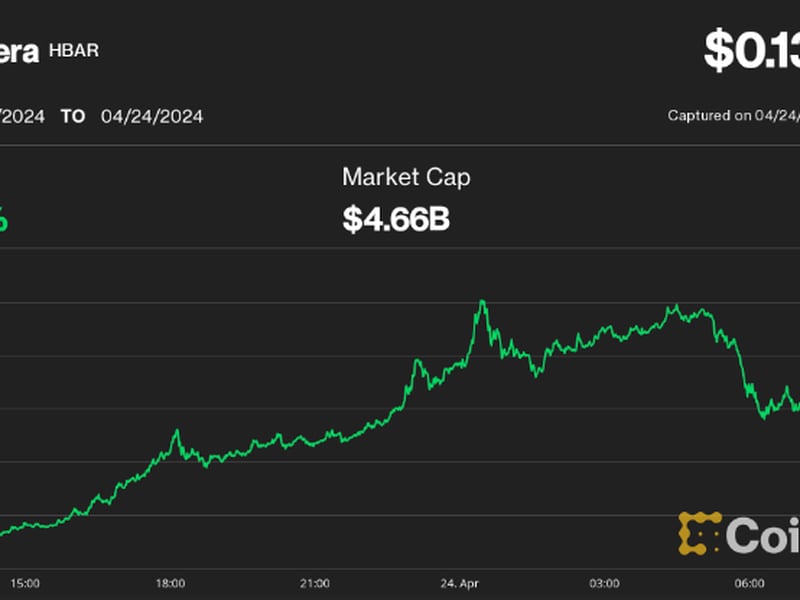This article originally appeared in First Mover, CoinDesk’s daily newsletter, putting the latest moves in crypto markets in context. Subscribe to get it in your inbox every day.
Latest Prices
Top Stories
Hedera’s native HBAR token surged by over 107% on Tuesday, then slipped 25%, as investors believed that BlackRock was involved in a fund tokenization project on the Hedera blockchain. On Tuesday, Hedera announced that BlackRock’s ICS U.S. Treasury money market fund had been tokenized on the Hedera blockchain in collaboration with Archax. Hedera supporters on social media began claiming that BlackRock chose Hedera to tokenize its fund, although this wasn’t the case. Archax CEO Graham Rodford said that “it was indeed an Archax choice to put [the fund] on Hedera,” in response to criticism about potentially misleading marketing from Hedera. The token is currently up 50% over the past 24 hours trading at 13 cents.
Stablecoin issuer Tether has said it will freeze wallets using USDT to evade sanctions on oil exports in Venezuela. The decision comes after Reuters reported that Venezuela's state-run oil company PDVSA increased its use of tether to bypass renewed U.S. sanctions on oil exports. The firm froze 41 wallets tied to the U.S. Treasury Department’s Office of Foreign Assets Control (OFAC) Specially Designated Nationals (SDN) list in December. “Tether respects the OFAC SDN list and is committed to working to ensure sanction addresses are frozen properly,” a Tether spokesperson told CoinDesk. PDVSA’s use of USDT, which began last year, has accelerated following the U.S.’s decision to reimpose sanctions due to concerns over Venezuela’s upcoming election.
Binance's founder and former chief executive, Changpeng "CZ" Zhao, should spend three years in prison for his role in enabling the crypto exchange to violate federal sanctions and money laundering laws, the U.S. Department of Justice said Tuesday night. The former CEO's attorneys argued he should serve no jail time, citing the fine he paid and his "extraordinary acceptance of responsibility." Attorneys with the DOJ filed a sentencing memo arguing he should spend 36 months in prison and pay a $50 million fine after he pleaded guilty to violating the Bank Secrecy Act last November. Hours later, Zhao's defense team filed its own sentencing memo, saying, "no defendant in a remotely similar BSA case has ever been sentenced to incarceration." Instead, they suggested he be sentenced to probation, which could include home confinement at his home in Abu Dhabi. "The sentence in this case will not just send a message to Zhao but also to the world. Zhao reaped vast rewards for his violation of U.S. law, and the price of that violation must be significant to effectively punish Zhao for his criminal acts and to deter others who are tempted to build fortunes and business empires by breaking U.S. law," the filing said.
